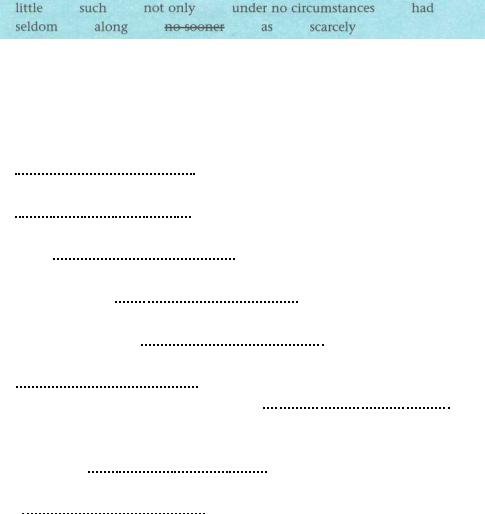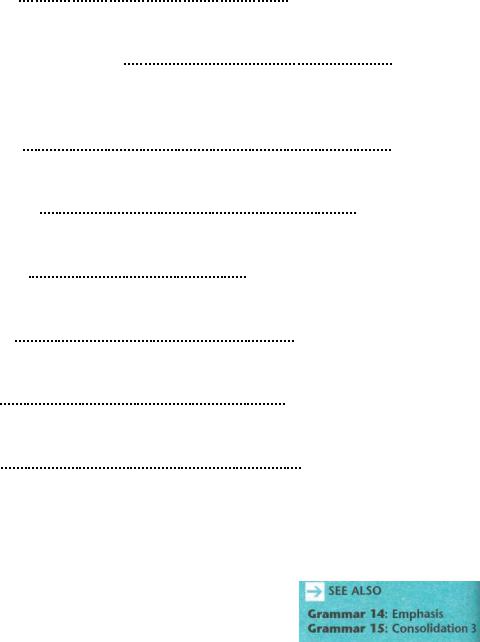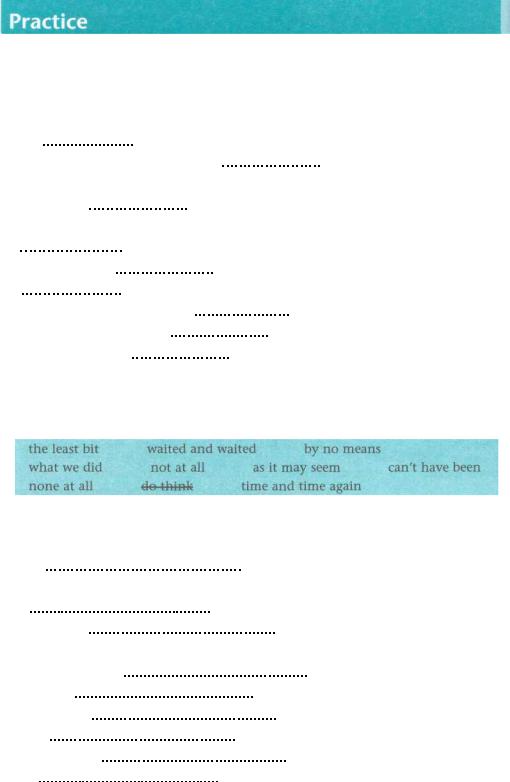
3_Macmillan_-_Advanced_Language_Practise
.pdf
ADVANCED LANGUAGE PRACTICE
3Decide which sentences are inappropriate in the contexts given.
a)Guest to host: 'So nice was that pudding, that I would like to have some more. 
b)Witness to court: 'No sooner had I turned out the light, than I heard a noise outside.'
c)News reader: 'Such was the force of the earthquake, that whole villages have been devastated.'
d)Parent to child: 'Should you fancy a pizza, let's order one now.'
e)Friend to friend: 'Never before have I seen this film.'
f)Politician to audience: 'Seldom has the country faced a greater threat.'
g)Celebrity to interviewer: 'Were I to have the time, I'd go climbing more often.'
h)Victim to police officer: 'Scarcely had we been introduced when he punched me for no reason.'
i)Printed notice: 'Under no circumstances is this control panel to be left unattended.'
j)Colleague to colleague: 'Should you change your mind, just let me know.'
4Complete each sentence with a suitable phrase containing the verb in brackets in an appropriate form.
a)Should  (need) anything, could you let me know?
(need) anything, could you let me know?
b) Were the plane |
(take off), everyone in it would |
|
|
have been killed. |
|
c) |
Had |
(study) harder, I would probably have |
|
passed all my exams. |
|
d) Should |
(be) in the neighbourhood, drop in. |
|
e) |
Had |
(go) to the doctor immediately, your |
|
daughter would not be so ill. |
|
f) |
Never before |
(spend) so much money on her |
|
daughter's birthday. |
|
g) Should |
(feel) hungry, just call room service, and |
|
|
order a meal. |
|
h) Were |
(offer) her the job, we couldn't be sure |
|
|
that she would accept. |
|
i) |
Had |
(take) the necessary measures, this political |
|
crisis could have been avoided, |
|
j) |
Scarcely |
(get) home when the police called us |
|
with news of Geoffrey. |
|
82

G R A M M A R 13 INVERSIO N
5Underline the correct word or phrase in each sentence.
a)Jim promised that he would never/never would he tell anyone else.
b)Not until it was too late / remembered/did I remember to call Susan.
c)Hardly had we settled down in our seats than/when the lights went out.
d)Only after checking three times / was/was I certain of the answer.
e)At no time I was aware/was I aware of anything out of the ordinary.
f)Only Catherine and Sally passed/did they pass the final examination.
g)Only when Pete has arrived/has Pete arrived can we begin the programme,
h)No sooner had it stopped raining than/when the sun came out.
6Complete the text by using the words and phrases from the box.
Well, ladies and gentlemen, we've done it again - another election victory. The
last four years of office has been a wonderful time for the party, a tale of adversity overcome.  had we come to office than the Stock Market crashed. But we survived that scare, and we came out of it stronger
had we come to office than the Stock Market crashed. But we survived that scare, and we came out of it stronger
for the experience. The opposition claimed we were faltering.
(2) |
have I heard such hypocrisy from a party which |
continued to squabble internally for the next four years. Then |
|
(3) |
came a fellow called David Rew, with his new |
breakaway Democratic party - but he didn't have much success in the opinion
polls! (4) did he claim he'd become Prime Minister
within three years, he also reckoned that this party was now unpopular with
younger voters. (5) |
|
did he realise that it would be |
the young voters who gave us an overwhelming vote of confidence in |
||
yesterday's election. (6) |
|
had the first votes rolled in |
when it was obvious that we would be re-elected with a huge majority. |
||
(7) |
was the extent of our victory that the New |
|
Democrats obtained a meagre five seats. (8) |
they |
|
known they would perform so poorly, I don't think they would have been quite so scathing in their criticism of our economic policy. But rest assured, ladies and
gentlemen, (9) |
will we rest on our laurels. There is |
no room for complacency in this government. And I am confident, |
|
(10) |
I'm sure are most of you, that the next four |
years will be a resounding success. Thank you.
83

A D V A N C ED LANGUAGE PRACTIC E
7 Complete the second sentence so that it has a similar meaning to the first sentence, using the word given. Do not change the word given.
a) Please never ever interrupt me when I'm in a meeting.
am
On no account  when I'm in a meeting.
when I'm in a meeting.
b)Nobody from this school has ever written a better composition. anyone
Never |
written a better composition. |
c) Such was the demand for tickets that people queued day and night. |
|
great |
|
The demand for tickets |
that people |
queued day and night. |
|
d)The money is not to be paid under any circumstances. no
Under |
to be paid. |
e)Three days passed before we arrived at the first oasis. had
Not until |
at the first oasis. |
f)Little did Brenda know what she was letting herself in for. no
Brenda |
what she was letting herself in for. |
g) It was only when I stopped that I realised something was wrong. |
|
did |
|
Only |
that something was wrong. |
h) The accused never expressed regret for what he had done. |
|
time |
|
At |
regret for what he had done. |
i) Exhaustion prevented any of the runners from finishing the race. |
|
were |
|
So |
of them finished the race. |
j) It's not common for there to be so much rain in March. see
Seldom......................................................................... |
so much rain in March. |

Changing word
order to change
focus
Explanations
•Passive
Passive constructions vary the way information is given in a sentence, putting more emphasis on what comes first. See Grammar 6 and 7.
All roads to the north have been blocked by snow.
•Fronting and inversion
Inversion here refers to changing the normal word order in the sentence so that a prepositional phrase is emphasised before the verb. This also involves putting the verb before the subject.
Suddenly down came the rain! Up in the air went the balloon.
Fronting involves changing the order of clauses in a sentence and putting first for emphasis a clause that would usually not be first.
/ don't know where the money is coming from.
Where the money is coming from, I don't know.
Time phrases can vary in position, and are often put first because the time reference is important.
At six o'clock Monica decided to phone the police. May clauses
There is a type of may clause introduced by although which can be inverted. It is a highly formal expression.
Although it may seem/be difficult, it is not impossible.
Difficult as/though it may seem/be, it is not impossible.
•Cleft and pseudo cleft sentences
These are sentences introduced by it is/it was or by a clause beginning what. Different parts of the sentence can be emphasised in this way.
In speech, stress and intonation also identify the emphasis.
With it is/was
Sue borrowed my bike last night.
It was Sue who borrowed my bike.
It was last night that Sue borrowed my bike.
It was my bike that Sue borrowed.
Sentences with because are also possible.
It was because I felt ill that I left.
Modal auxiliaries are also possible.
You can't have read the same book.
It can't have been the same book that you read.
85
A D V A N C E D L A N G U A G E PRACTICE
What clauses
These are common with verbs such as need, want, like, hate.
I hate rainy weather.
What I hate is rainy weather.
You need a holiday.
What you need is a holiday.
It is also possible to emphasise events, using auxiliary do/did.
Peter left the windows unlocked.
|
|
What Peter did was (to) leave the windows unlocked. |
|
|
|
They are destroying the environment. |
|
|
|
What they are doing is destroying the environment. |
|
|
|
Clauses beginning all emphasise 'the only thing'. |
|
|
|
/ only need another £15. |
|
|
|
All I need is another £15. |
|
Adding words for |
• Own |
|
|
emphasis |
|
This intensifies possessive adjectives. |
|
|
|
It was |
my own idea. |
|
• |
Very and |
indeed |
|
|
Very can be used emphatically to mean exactly/precisely. |
|
|
|
At the very same moment, the telephone rang. |
|
|
|
Very ... indeed is another way of intensifying adjectives. |
|
|
|
It was very cold indeed. |
|
|
• |
Emphasising negatives |
|
|
|
Ways of emphasising not include: at all, in the least, really. |
|
|
|
It was |
not at all cold. It was not cold at all. |
|
|
In the least/slightest usually adds bit if used before an adjective. |
|
|
|
/ wasn't interested in the slightest. |
|
|
|
I wasn't the least bit interested. |
|
|
|
No and none can be emphasised by at all and whatsoever. |
|
|
|
There |
were none left at all. |
|
|
There were no tickets left whatsoever. |
|
• The
The can emphasise uniqueness. It is heavily stressed in speech.
Surely you are not the Elizabeth Taylor, are you?
•Question words ending in -ever
These add an air of disbelief to the question.
Whatever are you doing? Whoever told you that?
GRAMMAR 14 EMPHASIS
• Auxiliary do
This can emphasise the verb, and is stressed in speech. / do like this film! It's really great!
It is also used in polite forms.
/do hope you'll come again! Do sit down!
•Adverbs and adjectives
A large number of adverbs and adjectives are used to add emphasis. Common examples are:
/ actually went inside one of the Pyramids.
It is by no means certain that the match will take place. Some people were even wearing pullovers, it was so cold. Her performance was sheer magic!
This book is utter nonsense!
The following examples are only possible with adjectives which express an absolute opinion (non-gradeable adjectives).
It was absolutely fantastic!
The third exam question was quite (completely) impossible. This guide book is utterly useless.
You were simply wonderful!
Don't cook the meat any more. It's just right!
|
• Echoing phrases with so |
|
These express agreement. |
|
A: This is the book you are looking for. B: So it is! |
Othermeans |
• Time phrases |
|
Common examples are: day after day; time and time again; over and over again; |
|
day in, day out |
|
David reads the same book over and over again! |
|
• Repetition of main verb |
|
/ tried and tried, but it was no use. |
|
• In the repetition of a phrase with a possessive it is possible to omit the first |
|
mention of the noun and use a possessive pronoun. |
|
Their marriage was a successful marriage. |
|
Theirs was a successful marriage. |
87

A D V A N C E D LANGUAG E PRACTIC E
1Complete each sentence with one suitable word.
a)You can't complain. It's your  fault, isn't it?
fault, isn't it?
b)A: That looks like Janet.
B:it is! My goodness, hasn't she changed.
c) |
I'm sorry to keep you waiting. I |
hope you haven't been here |
||
|
long. |
|
|
|
d) |
It is by no |
certain that the Prime Minister will attend the |
||
|
meeting. |
|
|
|
e) |
|
I really enjoy in winter is a bowl of hot soup. |
||
f) |
I searched and |
|
for my keys but I couldn't find them. |
|
g) |
|
you are all going to sleep I can't quite work out! |
||
h) |
What the government then |
|
was to raise interest rates. |
|
i) |
There isn't much to eat |
|
we've got is some leftovers. |
|
j) |
Cathy wasn't the |
|
bit put out when I couldn't make it to her |
|
|
wedding. |
|
|
|
2 Complete each sentence with a suitable phrase from the box.
a)I know you're busy, but I  you could have helped me with the decorating.
you could have helped me with the decorating.
b) |
It's |
certain that the president will be re-elected. |
c) |
You may have lots of restaurants where you live, but there are |
|
|
|
in this part of town. |
d) |
I told you |
about the leaking pipes, but you |
|
wouldn't listen. |
|
e) You don't seem |
interested in my problems! |
|
f) |
Strange |
, the bus is actually faster than the train. |
g) |
In the end |
was to call a plumber. |
h) We |
all day, but Chris never turned up. |
|
i) |
Pauline was |
bothered by our turning up so late. |
j) |
It |
Jim that you saw; he is in Germany at the |
|
moment. |
|

G R A M M A R 14 EMPHASI S
3Complete the second sentence so that it has a similar meaning to the first sentence, using the word given. Do not change the word given.
a)The car doesn't need anything else except new tyres.
needs
All  new tyres.
new tyres.
b)Brenda didn't worry at all about her exams. bit
Brenda wasn't the |
about her exams. |
c) The person who told me about the hotel was Keith. |
|
who
It
d) I had spent every last penny of my money.
told me about the hotel.
absolutely
I had |
whatsoever. |
e)Although the ticket may seem expensive, it is good value for money. though
Expensive
f)I really hate lukewarm food. stand
the ticket is good value for money.
What I |
lukewarm food. |
g) In the end Martha went to the police. |
|
was |
|
In the end what Martha |
to the police. |
h) I think you must have seen a ghost. |
|
that |
|
It |
you saw. |
i)Her car was the last car you'd expect to be stolen. very
Hers |
you'd expect to be stolen. |
j)The accident happened because someone was very careless. caused
Sheer |
happen. |
89

A D V A N C E D L A N G U A G E PRACTIC E
4Underline the correct word or phrase in each sentence.
a)Don't worry, I'm none at all/not at all tired.
b)I thought that speech was utter/utterly rubbish.
c)It was because/why the car broke down that we missed our plane.
d)A: You are sitting on my hat! B: So am I/So I am!
e)The sea was so rough that actually/even the experienced sailors were seasick.
f)Whatever/Why ever are you looking at me like that for?
g)I would like to make it quite/simply clear that we are just good friends,
h)This is my very private/very own computer.
i)On this course, we absolutely expect/do expect you to work hard.
j)There were warnings, but nothing whatsoever/nothing simply was done.
5 Read the dialogue and decide which answer (A, B or C) best fits each space.
Jane: Well, did you see 'Western Warrior' at the cinema?
Ben: |
Yes, and I thought it was very good (1) ..B. |
A lot of people had |
|||
|
warned me that the plot got a bit far-fetched, but I didn't notice anything |
||||
|
like that (2) |
What about you? |
|
||
Jane: No, I'm afraid I wasn't interested (3) |
I find these action films |
||||
|
(4) |
unbelievable and over the top. Give me 'Love on the Danube' |
|||
|
any day. I could watch that film (5) |
|
|||
Ben: |
Well, I (6) |
hope you'll come with me to see The Fall of Julian'. |
|||
Jane: It hasn't exactly done very well, has it? |
|
||||
Ben: |
(7) |
makes you think that? I heard it's been very popular. Some |
|||
|
newspaper critics have (8) |
suggested it'll win several Oscar awards. |
|||
Jane: Well I think it's (9) |
not possible to predict these things. You never |
||||
|
know what the judges will go for. Last year I was certain that The Leaping |
||||
|
Lady' would sweep the board, but in the end it got no awards (10) |
||||
1) A certainly |
|
B indeed |
C surely |
||
2) |
A at all |
|
B by no means |
C absolutely |
|
3) A whatever |
|
B slightly |
C in the least |
||
4) A very |
|
B sheer |
|
C utterly |
|
5) A over and over again |
B whatsoever |
C at the very moment |
|||
6) A would |
|
B do |
|
C utterly |
|
7) A Whatever |
|
B Whatsoever |
C Whoever |
||
8) A quite |
|
B utterly |
C even |
||
9) A completely |
B simply |
C utterly |
|||
10) A whatsoever |
B at least |
C indeed |
|||
90

GRAMMAR 14 EMPHASIS
O Choose the most appropriate continuation (1-10) for each sentence (a-j).
a) All of the trains were delayed by fog |
4... |
b)It wasn't so much my qualifications that impressed them
c)I found that I was spending more time staying late at the office
d)I don't find that the buses are especially late, actually
e)Actually my fridge is in quite good condition, considering its age
f)I don't find watching television particularly relaxing
g)I've decided to buy a new stereo after all
h)This book didn't teach me everything I know about cooking
i)The flight itself didn't really bother me at all
j)Actually I wasn't in the office yesterday.
1Where I am going to get the money from is another matter.
2What I really need is a new washing machine.
3It must have been my assistant whom you dealt with.
4It was after 10.00 when I finally got home.
5What really gets on my nerves is people who push into the queue.
6It was when I got off the plane that I felt ill.
7What I did in the end was to ask for a pay-rise.
8It was Sarah who taught me how to make bread.
9It was because I spoke well at the interview that I got the job.
10 What I like most is a long walk in the country.
7 Complete the dialogue by choosing the most appropriate word from the I
David: I can't make any sense of this letter from the council (1) |
|
||
all. It's (2) |
nonsense, if you ask me. (3) |
the |
|
council can't write in plain English is beyond me. (4) |
I |
||
really hate is this long-winded, complicated English. In my opinion, |
|
||
what they're doing (5) |
|
systematically destroying the |
|
language with all this new jargon - 'input', 'time window', 'feasibility |
|||
study' - (6) |
|
are they talking about? (7) |
we |
get is the same meaningless drivel over and over (8) |
|
||
Listen to this: 'Difficult (9) |
it may be for all parties |
|
|
concerned, this is the most viable solution on offer.' I have no idea, |
|
||
none (10) |
what that means. |
|
|
Eve: Oh for heaven's sake, shut up! |
|
||
91
